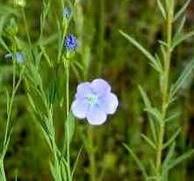Flax
The Flax seeds ate very rich in linseed oil, after expressing which, the refuse is oil-cake, a well-known fattening food for cattle. The oil exists chiefly in the outer skins of the seeds, and is easily extracted by boiling water, as in the making a linseed poultice.
Added Jul 11, 2010
| 7,056 Reads
The common Flax plant, from which we get our Linseed, is of great antiquity, dating from the twenty-third century before Christ, and having been cultivated in all countries down to the present time. But it is exhausting to the soil in England, and therefore not favoured in home growth for commercial uses. The seeds come to us chiefly from the Baltic. Nevertheless, the plant (Linum usitatissimum) is by no means uncommon in our cornfields, flowering in June, and ripening its seed in September. Provincially it is called "Lint" and "Lyne." A rustic proverb says "if Flax be put in the shoes it preserves from poverty"; wherever found it is probably an escape from cultivation. The word "flax" is derived from filare, to spin, or, filum, a thread; and the botanical title, linum, is got from the Celtic lin also signifying thread. The fibres of the bark are separated from the woody matter by soaking it in water, and they then form tow, which is afterwards spun into yarn, and woven into cloth. This water becomes poisonous, so that Henry the Eighth prohibited the washing of flax in any running stream. The Flax seeds ate very rich in linseed oil, after expressing which, the refuse is oil-cake, a well-known fattening food for cattle. The oil exists chiefly in the outer skins of the seeds, and is easily extracted by boiling water, as in the making a linseed poultice. These seeds contain gum, acetic acid, acetate and muriate of potash, and other salts, with twenty-two parts per cent. of the oil. They were taken as food by the ancient Greeks and Romans, whilst Hippocrates knew the demulcent properties of linseed. An infusion of the seeds has long been given as Linseed tea for soothing a sore chest or throat in severe catarrh, or pulmonary complaints; also the crushed seed is used for making poultices. Linseed oil has laxative properties, and forms, when mixed with lime water, or with spirit of turpentine, a capital external application to recent burns or scalds. Tumours of a simple nature, and sprains, may be usefully rubbed with Linseed oil; and another principal service to which the oil is put is for mixing the paints of artists. To make Linseed tea, wash two ounces of Linseed by putting them into a small strainer, and pouring cold water through it; then pare off as thinly as possible the yellow rind of half a lemon; to the Linseed and lemon rind add a quart of cold water, and allow them to simmer over the fire for an hour-and-a-half; strain away the seeds, and to each half-pint of the tea add a teaspoonful of sugar, or sugar candy, with some lemon juice, in the proportion of the juice of one lemon to each pint of tea. The seeds afford but little actual nourishment, and are difficult of digestion; they provoke troublesome flatulence, though sometimes used fraudulently for adulterating pepper. Flax seed has been mixed with corn for making bread, but it proved indigestible and hurtful to the stomach. In the sixteenth century during a scarcity of wheat, the inhabitants of Middleburgh had recourse to Linseed for making cakes, but the death of many citizens was caused thereby, it bringing about in those who partook of the cakes dreadful swellings on the body and face. There is an Act of Parliament still in force which forbids the steeping of Flax in rivers, or any waters which cattle are accustomed to drink, as it is found to communicate a poison destructive to cattle and to the fish inhabiting such waters. In Dundee a hank of yarn is worn round the loins as a cure for lumbago, and girls may be seen with a single thread of yarn round the head as an infallible specific for tic douloureux. The Purging Flax (Linum catharticum), or Mill Mountain (Kamailinon), or Ground Flax, is a variety of the Flax common on our heaths and pastures, being called also Fairy Flax from its delicacy, and Dwarf Flax. It contains a resinous, purgative principle, and is known to country folk as a safe, active purge. They infuse the herb in water, which they afterwards take medicinally. Also a tincture is made from the entire fresh plant, which may be given curatively for frequent, wattery, painless diarrhoea, two or three drops for a dose with water every hour or two until the flux is stayed.
Added Jul 11, 2010
| 7,056 Reads
Share The Magic ...
The GoE MONEY!!! Course - A Course In Real MONEY MAGIC!
|





















